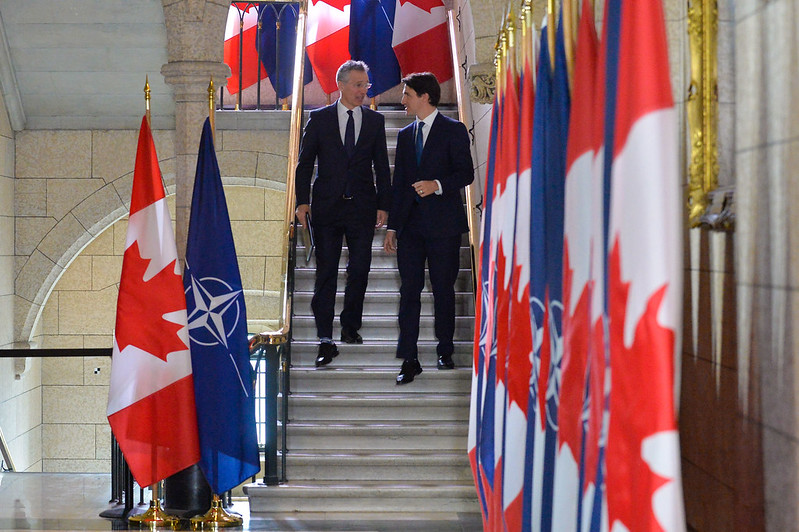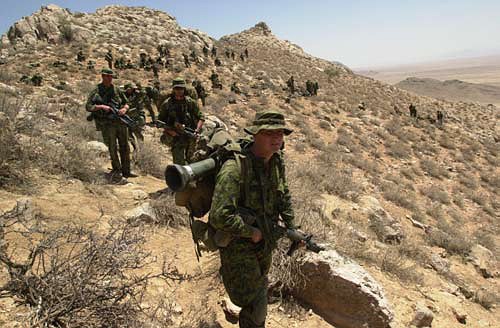Editor’s note: This is the editorial introduction to the NATO Association of Canada’s three-part series on Canada, NATO, and burden sharing. For the authors’ viewpoints, see the first, second, and third instalments.
Canada’s defence spending and contribution to NATO, notably its ability to live up to the alliance-wide pledge of allocating two per cent of the country’s GDP to defence, has again attracted media coverage. The renewed interest stems from the latest leaked US material. A document in the tranche allegedly indicated, in one media outlet’s paraphrasing of the sentiment, “that Prime Minister Justin Trudeau has told NATO officials privately that Canada will never reach the military spending target agreed to by members of the alliance.”
As topical as ever, Canada’s contribution to NATO, particularly in monetary terms, is the subject of scholarship and programming at the NATO Association of Canada. This month, the NATO Association of Canada has published a series of articles on Canada and NATO burden sharing from three contributors: Anessa Kimball, Professor, Department of Political Science, Université Laval; Elliot Hughes, Senior Government Relations and Public Affairs Advisor; and Benjamin Zyla, Professor, School of International Development and Global Studies, University of Ottawa. On April 27, the authors will participate in a moderated discussion open to the public, entitled “What’s Wrong with Two Per Cent? Reexamining Canada’s Contribution to NATO,” with Christian Leuprecht, Class of 1965 Distinguished Professor in Leadership, Royal Military College of Canada, in which they will expand on the perspectives articulated in their articles.
The topic of two per cent and the NATO Association of Canada’s event need situating. The figure that Trudeau reportedly disavowed, two per cent of GDP, has proved elusive for Canada. Set as a benchmark in 2006, Canada has yet to reach the two per cent mark (see 2006-2014 and 2014-2021 figures). And last fiscal year, defence spending amounted to just 1.32 per cent of GDP.
Canada recurrently missing the two per cent mark—and the problem of the “disappearing defence budget” more generally—has drawn criticism and prompted formal demands to meet the figure. A Report of the Standing Senate Committee on National Security and Defence (April 2017), for instance, advocated for the two per cent commitment. Likewise, in an April 2023 “call for action,” a number of prominent Canadians, including the Hon. David Collenette, chair of the NATO Association of Canada and former Minister of Defence, implored the government to “heed the recent call of the NATO Secretary General to treat 2% of GDP as a floor rather than a ceiling for defence spending.”
However, two per cent also has no shortage of detractors in Canada and beyond. According to one pointed commentary, “many agree that the two-per-cent figure is arbitrary, simplistic, and, for all intents and purposes, useless.” Adherents of this position believe that more compelling alternatives exist to the flawed two per cent. “There is a multitude of other ways to determine the fair contribution of each nation towards the overall shared responsibility for collective defence that could have been used,” writes Colonel John Alexander.
The need to transcend two per cent, as well as how to go about doing so, is the premise for the NATO Association of Canada’s three-part series on burden sharing and Canada’s contribution to NATO. Each of the contributors—Kimball, Hughes, and Zyla—offered novel insights on a long-standing problem of national significance.
In the first contribution, Kimball examines “reconceptualizing burden share metrics” in light of current circumstances, which include the war in Ukraine. Kimball specifically looks at how NATO Centres of Excellence, including the forthcoming Climate Change and Security Centre of Excellence in Montreal, represent alliance contributions and therefore can play a role in meeting burden-sharing requirements.
Hughes’ article, on the other hand, considers two per cent in the context of the Canadian Arctic. Hughes contends that greater attention to the Arctic, which would yield wide-ranging economic, social, and security benefits, could count as a vital Canadian contribution to NATO that would compensate for budgetary shortcomings.
The final contribution from Zyla likewise counsels against assessing Canada’s NATO contribution with metrics that dwell on “an input variable” like defence spending and two per cent. Rejecting this line of reasoning, Zyla favours an emphasis on “outcomes” and particularly “impacts.” For member states, what matters is “the long-lasting effect their contributions have on the provision of NATO public goods.”
This introduction to the series provides a fragmentary glimpse of a topic that, if the reaction to Trudeau’s reputed remarks are a bellwether, show no signs of declining in importance. This is, in part, because the debates about two per cent involve much larger and highly consequential issues, including how Canada ought to participate on the international stage as a NATO member, and whether its resources are sufficient to do so. The NATO Association of Canada’s upcoming talk, which the public is encouraged to attend (please register here), will explore the significance of the variously celebrated and maligned two per cent figure and its meaning for Canadian security.
Photo: “NATO Secretary General visits Canada,” April 4, 2018, by North Atlantic Treaty Organization, via Flickr. Licensed under CC BY-NC-ND 2.0.
Disclaimer: Any views or opinions expressed in articles are solely those of the authors and do not necessarily represent the views of the NATO Association of Canada.




